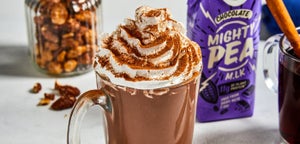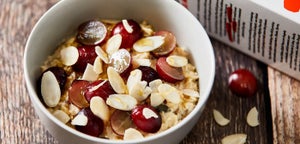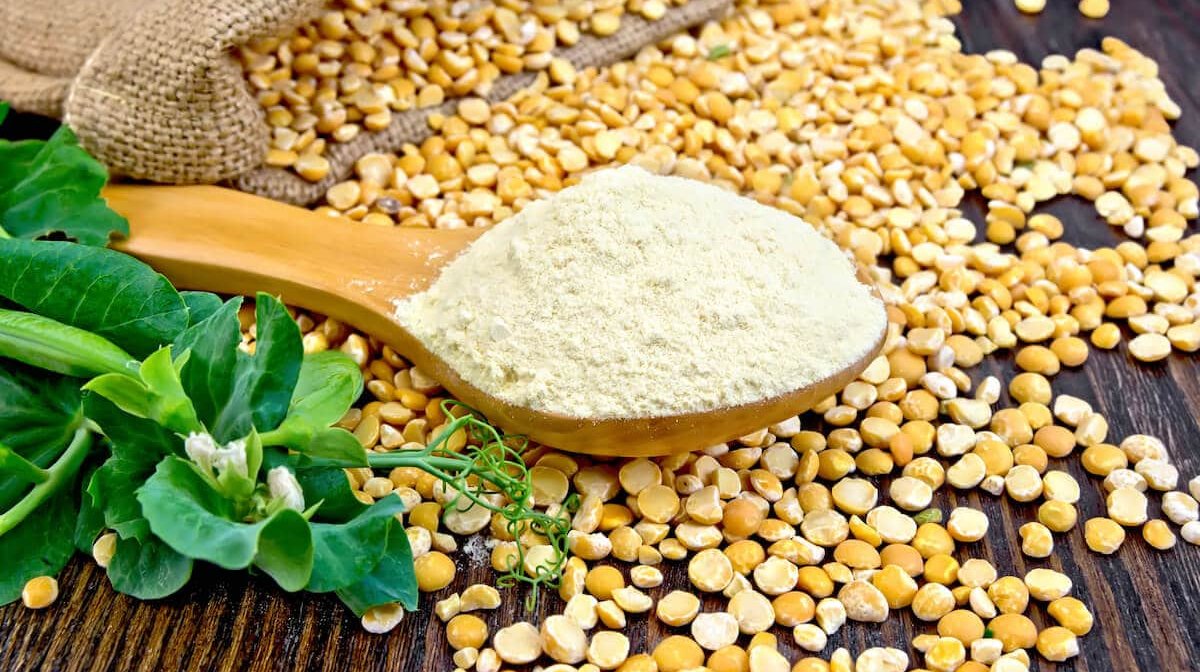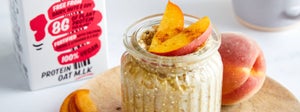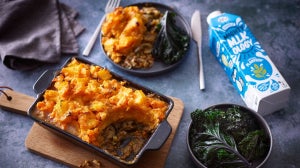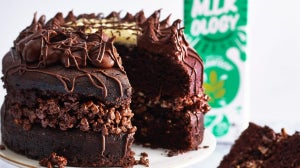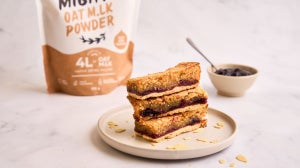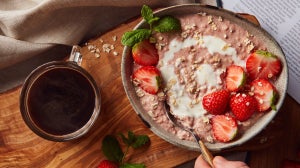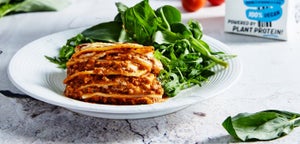
What is Pea Protein? Everything You Need to Know.
Everybody’s banging on about protein. But protein from peas – is that actually a thing?There’s a massive focus on healthy eating, nutrition and well-being these days. Lots of people are talking about protein and getting plenty in your diet every day.
Of course, most of us know that it’s a good thing, but might be a bit confused about what it is, why our bodies need it, where to get it and all the different kinds of protein out there. So let us tell you a bit more about protein in general and zero in on just one of them: pea protein.
What is pea protein?
It’s a high-quality, easily digested protein source made from yellow split peas. It’s packed full of goodness being rich in iron, arginine and a whole range of branched-chain amino acids. In short, it offers you big health benefits like improved muscle growth, weight loss, more feelings of fullness and it even supports your heart health[1].
This all means that pea protein is ideal if you want to boost the protein in your diet. It’s often used to bulk up the protein content of smoothies and shakes, and it’s naturally vegan, gluten-free, dairy-free and hypoallergenic. Plus, it doesn’t contain any of the top eight food allergens: peanuts, tree nuts, eggs, fish, shellfish, cow’s milk, wheat and soy.
Pea protein also blends well with water and has a less gritty or chalky texture than other plant-based protein powders like hemp.
How is pea protein made?
It’s surprisingly simple and involves drying and grinding dried peas into a fine flour. The flour is then mixed with water to remove the fibre and starch, which then leaves the protein, vitamins and minerals in a paste form.
The paste is then dried further to produce pure protein in the form of a white powder known as pea protein isolate or more simply, powder. This is then added to products like bread, cereals, ready-made meals and protein bars, as well as sports nutrition products like protein shakes[2].
Why you need pea protein
Protein is the building block of every living cell in your body and it has a big impact on your muscles, your energy levels and how full you feel.
It’s an essential macronutrient that your body needs for many different functions. It provides the framework for your cells, organs, bones, muscles, skin, hair, eyes and nails. It also boosts your immune system and helps make enzymes and hormones, as well as many other clever chemical reactions in your body. In short, without protein you wouldn’t survive.
Here’s how it works. To use the protein you consume, your digestive system breaks it down into amino acids. Your body can synthesize some amino acids, but nine of the 22 amino acids it needs can only come from your diet. Of those nine amino acids, three branched-chain amino acids or BCAAs for short are crucial for building and maintaining muscle. These are leucine, isoleucine and valine. [3]
How much protein do you need?
You need a minimum amount of protein every day as your body can’t store protein – sadly unlike two other macronutrients carbohydrates and fats. If you’re generally healthy but not physically active, you can probably get enough protein from whole foods.
However, if you’re an athlete doing intensive training or a bodybuilder working to boost muscle growth, you might need more high quality protein every day. You would also benefit from extra protein when you’re getting over an illness or losing muscle mass as you get older. Or you might just need some as a pick-me-up to help you get through your busy life. [4]
What does the RNI say?
RNI guidelines suggest that if you’re a sedentary man, which means you’re not doing much exercise, you should consume 56g of protein every day. If you’re a sedentary woman you should take in 46g of protein every day.
But, if you’re an active adult, how much extra protein do you need? Obviously, it needs to be over 46g or 56g depending on your sex. But how much more? Levels of 1, 1.3, and 1.6 g protein per kg of bodyweight per day are recommended if you’re doing minimal, moderate or intense physical activity respectively. If you’re a healthy adult you can consume protein at 2g per kg bodyweight per day over a long period, and the maximum upper limit suggested is 3.5 g per kg bodyweight per day.
Is pea protein a complete protein?
Unlike many other plant-based proteins, pea protein is a complete protein similar to meat. This means it’s a source of all nine essential amino acids that are vital for you to maintain a healthy, well-functioning body.
Some people split hairs and say that it’s not officially a complete protein because although it does contain methionine, it doesn’t contain much. A complete protein provides at least 25 mg per gram of this amino acid, and pea protein only delivers around 11 mg per gram. So you decide.
What’s the protein content of yellow split peas?
There are two main types of split peas: green and yellow. Both are nutritious and wholesome but they have different flavours - green split peas are more sweet while yellow peas are more mild, but slightly more starchy.
There’s a good level of protein in peas. In fact, a 100 gram serving of yellow split peas can provide 14% to 18% of your daily protein needs, and are a good source of fibre and protein while being low in fat, cholesterol and sodium. They also provide vitamins and minerals including zinc, potassium and iron. A 100 gram serving of cooked yellow split peas boiled without salt contains 118 calories, 0.4g of fat, 2mg of sodium, 21.1g of carbohydrates, 8.3g of fibre, 2.9g of sugars and 8.3g of protein. [5]
Is pea protein good for you?
Pea protein powder not only gives great nutrition, it’s also good for your overall health and well-being.
It contains all nine essential amino acids that your body cannot create and must get from food. It’s also a great source of branched-chain amino acids which promotes healthy blood flow and heart health, and leucine, isoleucine and valine which all support muscle growth.
Pea protein powders are also packed with iron. Most products contain around 5mg to 7.5 mg of iron per serving — that’s 28% to 42% of the recommended daily amount for pre-menopausal women and 62% to 94% of the RDI for men and post-menopausal women.[6]
Studies show that pea protein powder can also help build muscle when combined with resistance training. In one 12-week study, weightlifting men who consumed 50 grams of pea protein per day gained the same amount of muscle as those taking whey protein. This suggests that pea protein powder is just as effective at building muscles as dairy-based protein powders. [7]
Research has also shown that protein helps you feel fuller for longer than carbohydrates or fat.[8] So high protein diets can help reduce your overall calorie intake and support gradual weight loss over time. Pea protein is therefore an easy way to increase your protein intake and your feelings of fullness after eating.
How to use it
Most people who use pea protein powder add it to smoothies or mix it with juice or water as a quick and easy post-workout drink. You can also stir it into oatmeal, your porridge or cereals, add it to baked goodies like muffins, brownies or waffles or whisk it into plant-based milk to create a more complete protein source. How about blending it into a smoothie and freezing it in ice lolly moulds?
Meet our MIGHTY pea protein products
For starters, there’s our MIGHTY Plant Protein Powders which are 100% vegan combos of high-quality pea protein + other plant proteins developed to drive your through the day.
Then there’s our irresistible range of milkshakes which are 100% vegan, dairy-free and packed with natural goodness. Our shakes use pea protein to pack a 6 gram plant protein boost and are available in chocolate, salted caramel and banana and oat flavours.
And of course, as we’re MIGHTY M.lks we have our MIGHTY pea m.lks which combine pea protein from yellow split peas with lots of other plant-based goodies to create delicious, vegan m.lk that’s good for you and the planet.

Related Articles
